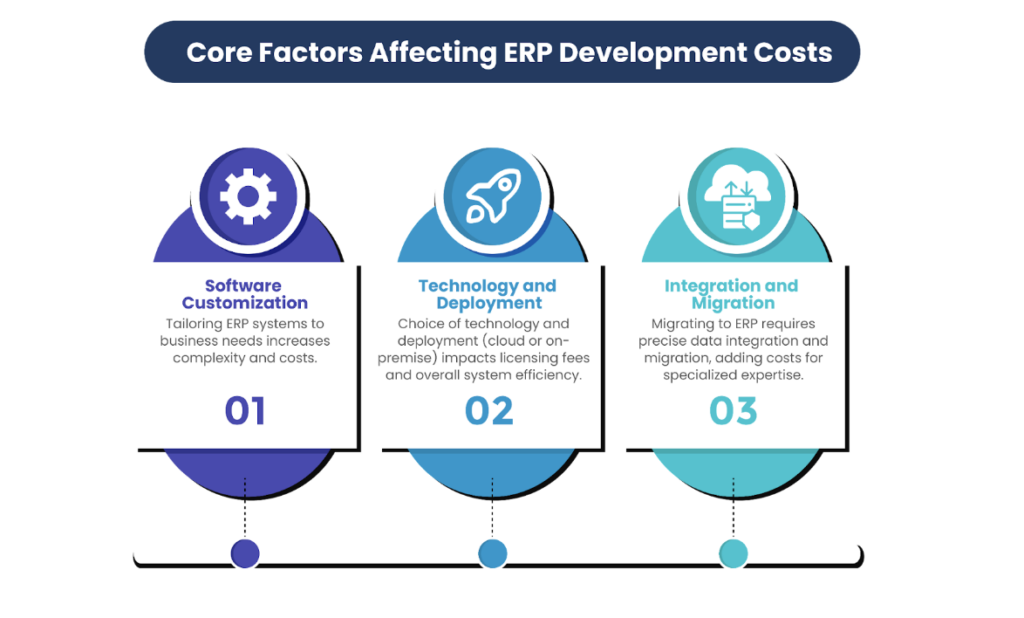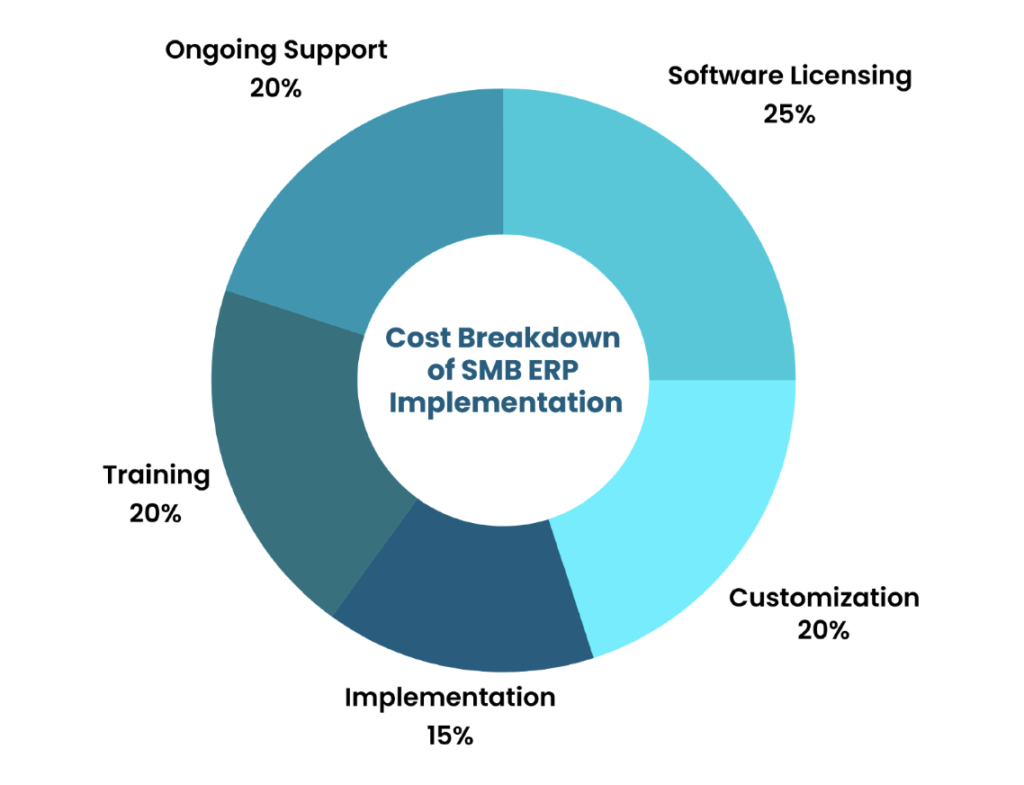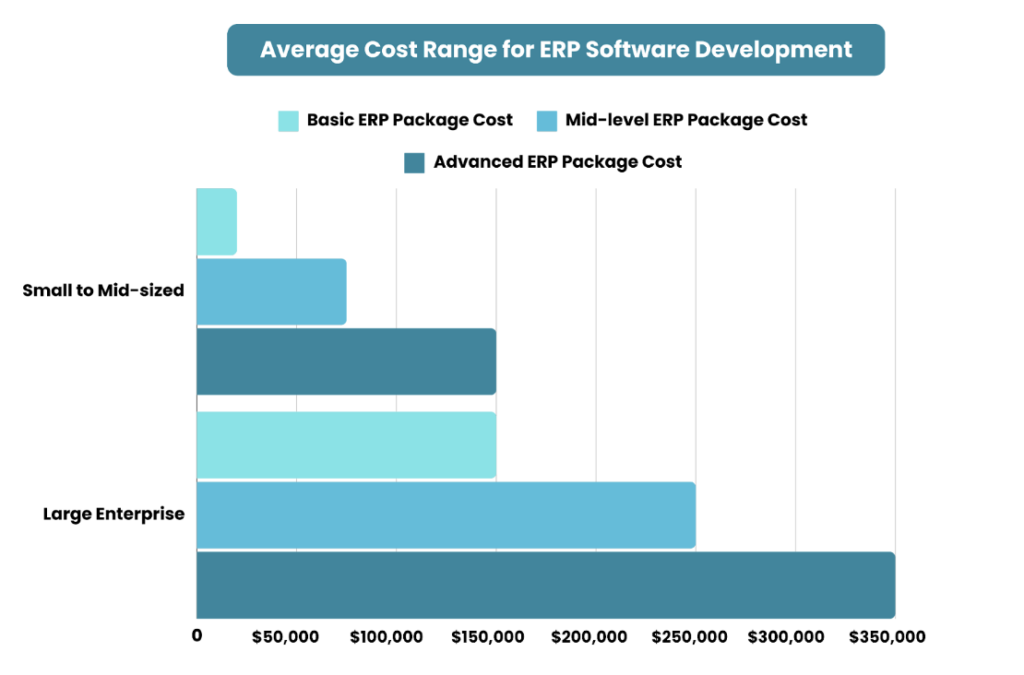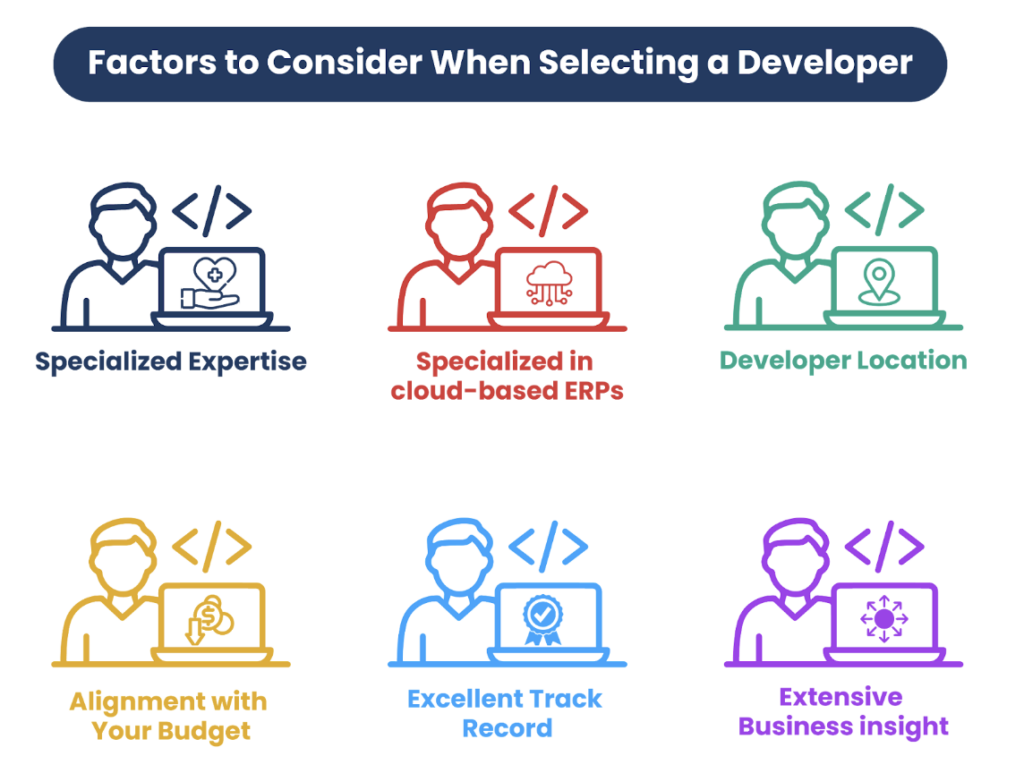ERP Software Development Cost: Insights for Companies
 17 May 2024
17 May 2024? Listen to the Summary of this article in Audio
The architecture of modern business is increasingly reliant on ERP (Enterprise Resource Planning) systems, crucial for streamlining complex business processes and enhancing operational efficiency. With a growing demand underlined by an expected market surge to $100.7 billion by 2025, the ERP software development cost plays a pivotal role in IT investment strategies. Ranging widely from $25,000 to a substantial $350,000, the cost to build an ERP system is governed by distinctive factors that demand attention for accurate budgeting and heightened return on investment.
Businesses, both burgeoning and established, must evaluate the ERP software pricing landscape to discern custom solutions that resonate with their unique requirements. Given the high stakes in operational transformations, understanding the ERP system development cost is fundamental for companies intent on sustaining competitive advantage. IT entrepreneurs, in particular, must align with a knowledgeable ERP software development company to ensure a calibrated approach towards bespoke and cost-effective ERP solutions.
Indeed, the custom ERP software cost is variable, influenced by a confluence of factors such as functionality, technology, user count, and customization extendance. These dynamics invoke a strategic financial blueprinting for organizations that consider incorporating an ERP system pivotal to their business revolution and digital maturity.
Key Takeaways
- ERP systems are critical for operational efficiency and are a key player in the digital transformation of businesses.
- Determining the ERP software development cost is essential for effective IT investment and strategy.
- The cost of developing a custom ERP system can vary greatly based on requirements and desired functionalities.
- Collaboration with a reputable ERP software development company is crucial for bespoke solutions.
- Financial forecasting and budgeting for ERP software must account for the total cost of ownership and potential ROI.
Understanding ERP Software
An Enterprise Resource Planning (ERP) system serves as the central hub for data and operations within modern businesses. By integrating various business processes into a single comprehensive framework, ERP software enhances visibility and efficiency across an organization. Advanced technologies such as AI analytics and Machine Learning are embedded within ERP systems, enabling them to adapt swiftly to customer needs and optimize overall experiences.
In assessing the erp software development price, it is crucial for companies to understand its role within the organization. A well-implemented ERP system not only streamlines operations but also contributes to strategic decision-making, effectively shaping the future of the business landscape.
The Role of ERP in Modern Business
ERP systems have emerged as a cornerstone in the quest for organizational transformation and digital maturity. They facilitate the enhancement of operational effectiveness, offering scalable solutions that grow with the business. The erp implementation cost reflects an investment in the organization’s ability to remain agile and responsive in a rapidly evolving market.
To accurately forecast the budget for ERP integration, businesses must take into account not just the ERP software customization cost, but also subsequent expenses such as the ERP software maintenance cost. These recurrent costs are an inevitable part of owning a dynamic system that remains in step with technological advancements. Therefore, ERP software cost estimation should be approached with comprehensive planning, considering all facets of ERP implementation and its lifecycle within the company.
- ERP systems centralize business operations for improved data visibility and operational control.
- State-of-the-art technologies embedded within ERP solutions empower businesses to meet and anticipate consumer demands proficiently.
- Implementing an ERP system is an investment that requires careful consideration of initial development costs and ongoing maintenance and customization expenses.
Core Factors Affecting ERP Development Costs
The intricate sapling of an ERP system’s price tag germinates from a seedbed of varied and complex factors. The assessment of these factors requires a throughline from initial conception to post-deployment, informing the nuanced process of ERP software budgeting. An understanding of these underlying elements provides foresight in optimizing the deployment of resources and anticipating the holistic ERP system cost.

1. Software Complexity and Custom Features
By virtue of their utility, ERP systems often require varying degrees of personalization to meet specific business needs, elevating the ERP customization cost. The intricacies introduced by additional custom features not only enhance functional richness but also intricately lace the broader tapestry of development expenses. The synchronization of features with user roles and industry-specific workflows incurs a cost reflective of the software’s scalability and complexity.
2. Technology Stack and Deployment Model
Modern ERP systems rest upon the shoulders of a diverse technology stack and are influenced by the choice between cloud-based platforms or on-premise installations. The selection of each comes wedded to its own set of implications on ERP software licensing fees. With tech stack choices impacting the efficiency and resilience of the ERP solution, the decisions encroach significantly upon the ERP software cost factors – each increment in sophistication reflecting in the associated financial commitments.
3. Integration and Data Migration Considerations
Transitioning to an ERP system may necessitate deep-rooted changes within an organization’s present data ecosystem. The confluence of legacy systems and new ERP environments demands meticulous integration strategies and data migration protocols. This harmonization pushes the boundaries of the conventional ERP system cost, necessitating investments in bridging technologies and specialized expertise to amalgamate disparate data sources with precision and security.
Comprehending these core components of ERP development unveils the monetary landscape that companies must navigate to acquire a bespoke solution tailored to their operational blueprint. An introspective ushering through these determinants can enlighten the path for IT entrepreneurs, molding an informed scaffold for strategic ERP investment.
Our experienced team can help architect and develop a fully customized ERP system tailored to your unique business needs and industry requirements.
Average Cost Range for ERP Software Development
Understanding the financial implications of ERP software development is critical for businesses of all sizes. With ERP solutions being central to business efficiency, the average ERP software price fluctuates significantly depending on multiple variables. Whether it’s a small startup or a sprawling enterprise, budgeting for an ERP system entails a meticulous ERP software cost breakdown that incorporates both upfront and ongoing expenses associated with the software’s lifecycle.
Let’s break down the costs further considering the size of the business and nature of the ERP solution required.
Cost Estimates for Small to Mid-sized Businesses
Small to mid-sized businesses seeking to benefit from ERP systems can expect a range of cost considerations. The custom ERP software cost for smaller-scale operations generally leans towards the lower end of the spectrum, starting from around $20,000. This tier often pursues basic ERP functionalities with a focus on core modules such as finance and inventory management. As these businesses scale, so does the complexity and price of ERP software, potentially reaching up to $150,000.
Factors influencing this cost variation include the number of users, degree of customization, and specific industry needs that necessitate specialized modules or integrations.

Budgeting for Enterprise ERP Solutions
Larger enterprises with expansive operational needs have a different pricing dynamic. Enterprise ERPs encompass a broader ERP software cost breakdown, integrating advanced analytics, extensive customization, and powerful automation capabilities. These robust solutions have a starting price point around $150,000 and can soar to $350,000 or more considering the heightened complexity, scalability requirements, and extensive user base.
Additionally, global companies might encounter variable pricing due to the geographical location of their development teams, adding another layer to the overall ERP implementation pricing.
| Business Size | Basic ERP Package Cost | Mid-level ERP Package Cost | Advanced ERP Package Cost |
|---|---|---|---|
| Small to Mid-sized | $20,000 | $75,000 | $150,000 |
| Large Enterprise | $150,000 | $250,000 | $350,000+ |
When planning for ERP software, consideration of the total cost of ownership is as crucial as the initial investment. This includes acknowledging expenses like ongoing support, maintenance, and periodic upgrades necessary to keep up with technological advancements.

Ultimately, detailed financial planning and understanding of the ERP software cost breakdown will empower businesses to allocate their IT budgets effectively, maximizing the return on their ERP investment.
Let our experts guide you in selecting the right ERP solution that fits your budget while delivering maximum ROI for your business.
Strategies to Optimize ERP Development Expenses
To achieve a cost-effective ERP system development, meticulous planning and strategic actions are vital. As entrepreneurs and IT leaders investigate ERP software cost estimation, emphasis on cost optimization can yield sustainable and efficient system deployment. Below are tailored strategies aimed at curbing overheads while ensuring key functionalities are not compromised.
Prioritizing Essential ERP Modules
One of the core strategies to manage ERP system pricing is by identifying and focusing on the modules that are indispensable for your business. A methodical evaluation of operational dynamics will reveal the crucial ERP elements that drive business value. By implementing only the necessary modules initially, organizations can substantially minimize initial expenditures, thus mapping a frugal path in complex ERP landscape.
The prioritization process should consider the modules that will deliver immediate improvements in productivity and data accuracy, such as:
- Financial Management
- Inventory Control
- Customer Relationship Management (CRM)
- Supply Chain Management
Post-deployment, companies can then adopt an incremental approach, integrating additional modules as necessitated by business growth or process evolution.
Leveraging Open Source ERP Platforms
Undoubtedly, open source platforms emerge as a pinnacle in cost-saving endeavors. These platforms provide robust frameworks at a fraction of the cost associated with proprietary software. Opting for an open source ERP solution, businesses can significantly trim down expenses related to licensing fees which in turn contributes to a reduction in overall ERP software cost estimation.
Open-source ERPs also offer the flexibility for customization without the need for exorbitant outlays on proprietary tools or vendor-specific programming expertise. Yet, organizations must consider potential costs for professional services to customize and maintain these platforms to ensure their strategies for cost-effective erp system development remain on target.
In summary, the dual focus on essential modules and leveraging open-source ERP platforms paves the way for cost-conscious businesses to deploy efficient ERP systems without sacrificing quality. These strategies align with prudent financial planning and resource allocation, fostering a practical roadmap for organizations navigating the intricate world of ERP implementation.
Choosing Your ERP Development Team
Selecting the right ERP development team is an investment in your business’s technological empowerment. A skilled team can navigate the complexities of system integration, tailoring solutions to your specific needs. As the ERP system development cost can be significant, understanding the nuances of choosing ERP developers who are the best fit for your project is quintessential.
Factors to Consider When Selecting a Developer

Picking an ERP software development company involves more than just cost considerations. The expertise and industry fit are just as crucial to ensure that the ERP solution developed meets your organizational goals. Here’s what to look for:
- Specialized Expertise: Evaluate the company’s knowledge specifically in ERP software development. Ascertain whether they have the expertise to handle the complexities of your industry.
- Past Project Experiences: Past projects can be indicative of a developer’s capability. Review their portfolio to ensure they have a successful track record with ERP projects, especially ones similar to your scope.
- Developer Location: Consider where the development team is based, as this can affect communication, collaboration, and ultimately the cost.
- Budget Compatibility: Ensure that your budget aligns with the rates offered by the developers without compromising on the quality of the ERP system.
- Timelines: Your ERP project should be implemented in a timely manner. Confirm that the developer can meet your project deadlines.
- Understands Industry Requirements: The developers should have a profound understanding of your business domain to tailor the ERP system to your specific needs.
Creating a detailed overview can help in the selection process, and for this reason, here is a comparative assessment of potential ERP development partners:
| Criteria | Company A | Company B | Company C |
|---|---|---|---|
| Industry Experience | 10+ years in manufacturing ERP | 5 years in retail ERP | 8 years in healthcare ERP |
| Project Portfolio | Diverse, with large scale ERPs | Mostly small to medium ERPs | Specialized in cloud-based ERPs |
| Location | North America | Eastern Europe | Asia Pacific |
| Budget Match | High | Moderate | Low |
| Ability to Meet Deadlines | Consistent | Varies | Excellent Track Record |
| Understanding of Business Needs | Extensive | Adequate | In-depth |
Taking a structured approach to evaluating and choosing ERP developers, businesses can engage an ERP software development company that not only fits their budget but also has the necessary expertise to deliver a high-quality ERP system, ensuring that the ERP system development cost translates into a valuable investment.
Our team specializes in delivering high-quality, customized ERP solutions while optimizing costs through strategic planning and implementation.
Conclusion: Balancing Cost and Quality in ERP Development
When embarking on the pathway to ERP software development, it is imperative for organizations to adeptly balance the cost of ERP software development against the imperative for a quality ERP system implementation. A meticulous and strategic approach to planning, inclusive of a rigorous ERP software cost-benefit analysis, can assist businesses in developing a strategy that aligns with both fiscal constraints and overarching corporate objectives. As organizations conclude their ERP development journey, the crucial intersection of affordability and quality must yield a system that engenders tangible business value, driving growth and achieving operational excellence.
The successful implementation of an ERP system is contingent upon the commitment to thorough cost management, encompassing not only the initial outlay but also the totality of the lifecycle costs, including maintenance and upgrades. Companies embarking on the development of an ERP must perform a comprehensive analysis of both upfront and residual expenses, judiciously evaluating each in relation to the anticipated return.
- ERP development cost must account for the intricate blend of license fees, customization, and support.
- Quality system implementation is underpinned by agile and efficient technology, demanding expertise and meticulous product selection.
- A cost-benefit analysis will help illuminate the long-term value of ERP software relative to its initial and ongoing investment.
Effective ERP software transcends the mere mechanics of organizational processes and crystallizes as a decision-making nexus, potentiating data-driven insights and streamlined workflows. Thus, it is incumbent upon companies to amalgamate a thorough understanding of fiscal implications with the pursuit of a system that imparts robust functionality, adaptability, and user-centricity.
“Enterprises must strive for an equilibrium where the investment in ERP software development not only meets but propels business processes, reaffirming the integral ethos that technology should be leveraged to enhance, not encumber, corporate growth.”
In the final analysis, the transformative power of ERP systems is realized through a blend of conscientious budget allocation and an unwavering commitment to quality. Future-centric enterprises must ensure that every financial commitment towards ERP development augurs well for the organizational narrative, promoting scalability and adaptability in the ever-evolving technological panorama.
FAQ
What factors contribute to the overall cost of ERP software development?
The cost of ERP software development is influenced by several factors, including the number of users, required features, degree of customization, technology integrations, complexity of implementation, as well as ongoing maintenance and support. Developer expertise and location can also affect pricing.
How much does it cost to develop custom ERP software?
The cost to develop custom ERP software can vary dramatically, typically ranging from ,000 to 0,000. The final price tag depends on the size and scope of the project, the level of customization needed, and the specific requirements of the business.
Can open-source ERP platforms help reduce development costs?
Yes, leveraging open-source ERP platforms can help reduce development costs. These platforms come with a range of standard functionalities and modules that can be customized to suit business requirements, potentially lowering the investment needed for custom development.
What are the ongoing costs associated with ERP software after implementation?
After implementation, ERP software incurs ongoing costs that can include licensing fees, maintenance and support, software updates and enhancements, as well as training for users. These need to be factored into the total cost of ownership over the lifecycle of the software.
Is it more cost-effective to prioritize ERP modules that align with core business functions?
Yes, it is often more cost-effective to prioritize ERP modules that directly align with core business functions. By focusing on essential features, businesses can ensure that they invest in capabilities that provide the most benefit and ROI, while avoiding expenditure on unnecessary functionalities.
How does the technology stack influence ERP software development costs?
The chosen technology stack can impact the cost of ERP development, as some technologies might be more expensive to implement due to licensing fees or the need for specialized developers. The technology stack also affects scalability, performance, and ease of integration, which can indirectly influence costs.
What is the average cost for ERP implementation for small to mid-sized businesses?
The average ERP implementation cost for small to mid-sized businesses can range from ,000 to 0,000. However, this can vary depending on the complexity of the business processes, the extent of customization, and the number of users.
What should be considered when selecting an ERP software development team?
When selecting an ERP development team, factors to consider include their expertise in ERP systems, track record with similar projects, ability to work within budget constraints, their understanding of your industry, and the cost of their services. It’s important to choose a team that can deliver high-quality work and understands your business needs.
How are ERP customization costs estimated?
ERP customization costs are estimated based on the complexity of the custom features required, the effort needed for development and integration, and the time it takes to implement those features. The more complex the customization, the higher the cost.
What are ERP software licensing fees?
ERP software licensing fees are the costs associated with the legal use of the ERP software. They can be based on a subscription model or a one-time purchase and vary depending on the vendor, the number of users, and the level of access or features required.









